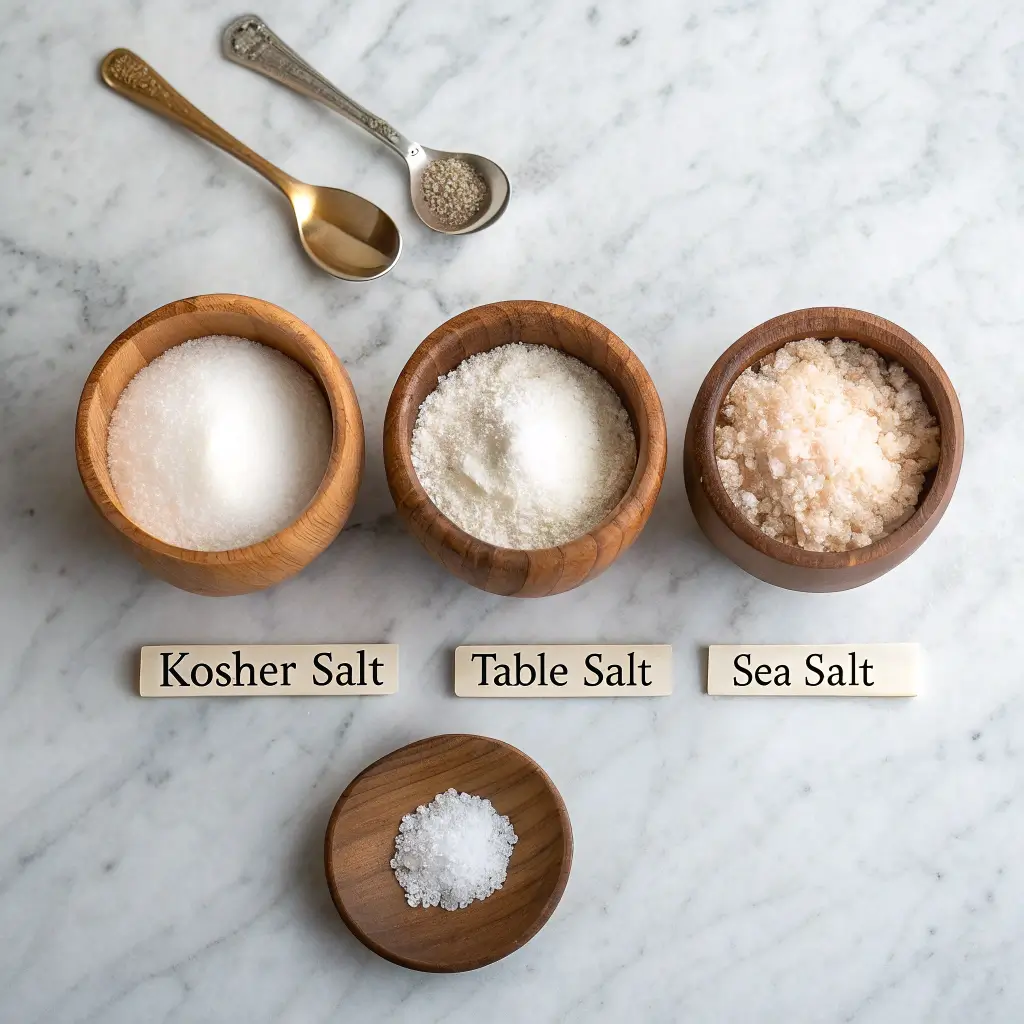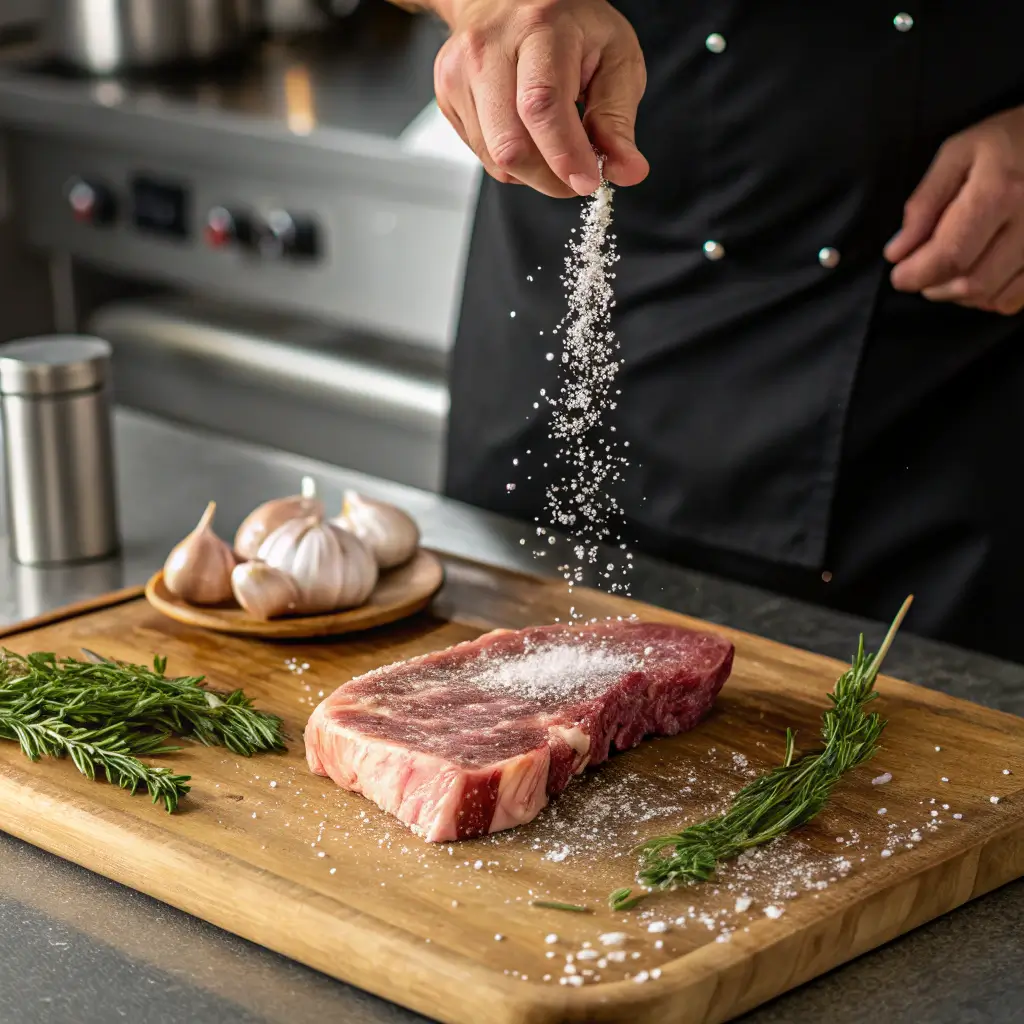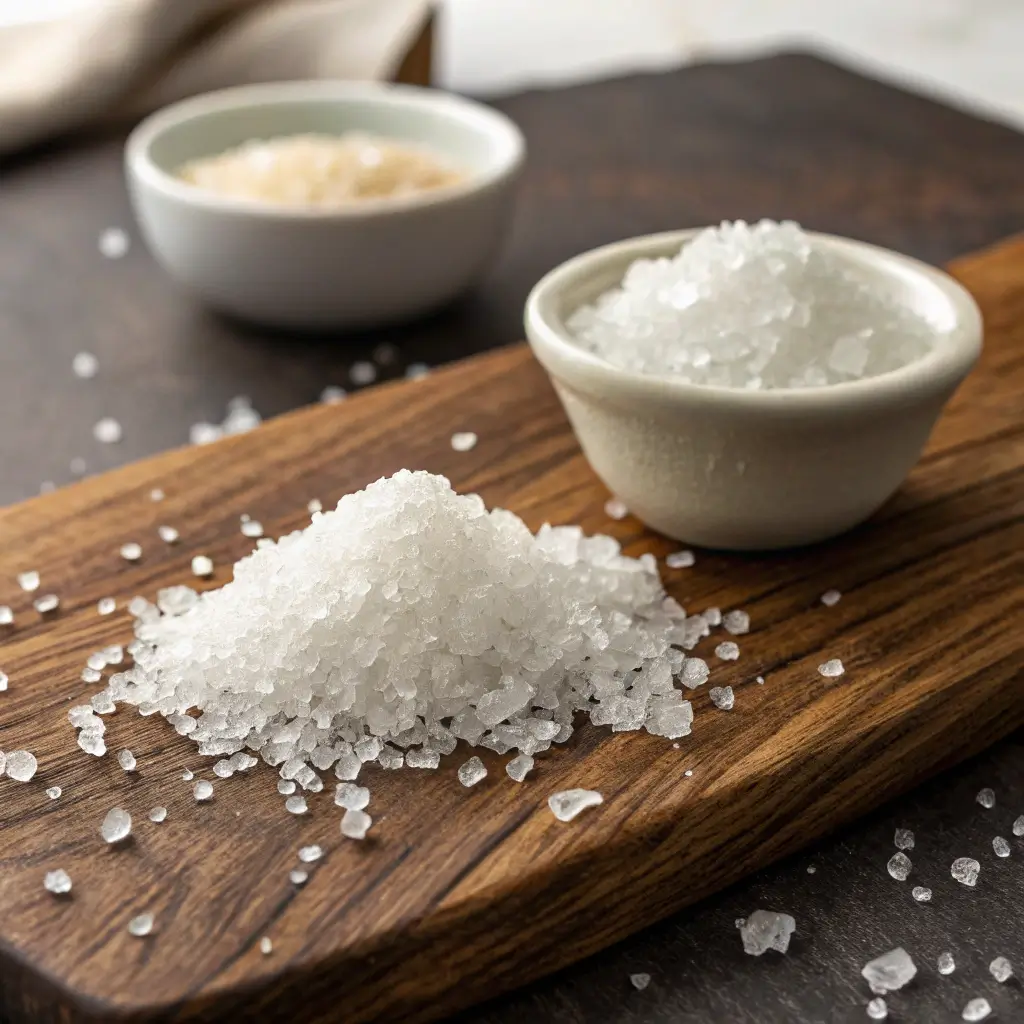When it comes to seasoning, this coarse, flake-style salt stands out in both professional kitchens and home pantries. But what exactly makes it so widely favored? Unlike regular table salt, it offers a unique combination of texture, purity, and versatility qualities that make it essential in modern cooking. From its roots in religious tradition to its growing popularity in everyday recipes, this type of salt has a rich backstory and a wide range of practical uses worth exploring.

In this article, we’ll uncover everything about kosher salt from how it’s made and why it’s used in Jewish dietary laws, to its health benefits and the best ways to cook with it. We’ll also compare it to sea salt and table salt, review popular brands, and bust some myths.
Understanding Kosher Salt
What is Kosher Salt?
This coarse, flaky salt is primarily used in cooking rather than as a tabletop condiment. Despite its name, it isn’t considered “kosher” due to a blessing or religious ritual, but rather for its traditional use in koshering meat a process that draws out blood to comply with Jewish dietary laws.
Its larger, irregular crystals make it easier to pinch and distribute over food compared to finer varieties like table salt. This functional texture has made it a favorite among chefs around the world.
Origins and Production Process of Kosher Salt
This type of coarse salt is typically sourced from underground deposits or created through seawater evaporation. What distinguishes it isn’t where it comes from, but how it’s processed. Unlike table salt, it generally lacks additives such as iodine or anti-caking agents resulting in a clean, pure flavor that many cooks prefer.
There are two main methods for making kosher salt:
| Production Method | Description |
|---|---|
| Roller-dried process | Produces thin, flaky crystals (e.g., Morton Kosher Salt) |
| Evaporation method | Yields more pyramid-like crystals (e.g., Diamond Crystal Kosher Salt) |
These differences in shape and texture affect how much salt you use in recipes, so volume measurements aren’t always interchangeable between brands.
Kosher Salt vs Table Salt
Key Physical and Chemical Differences
At first glance, this flake-style salt and standard table salt may appear similar, but the differences go well beyond texture. The coarse variety features larger, flakier grains, whereas table salt is finely ground and often contains additives like iodine and anti-caking agents.
Here’s a quick comparison table:
| Feature | Kosher Salt | Table Salt |
|---|---|---|
| Grain size | Large, coarse flakes | Fine, small granules |
| Taste | Clean, pure taste | Slightly metallic (iodized) |
| Additives | Typically none | Iodine, anti-caking agents |
| Usage | Best for cooking, seasoning meat | Best for baking, general seasoning |
| Dissolves | Slower | Faster |
Because of these differences, kosher salt allows for more controlled seasoning, which is why many chefs prefer it when seasoning meats or vegetables during prep.
Why Chefs Prefer Kosher Salt in Cooking
Professional kitchens around the world rely on kosher salt not only because it tastes better, but also because it offers better grip and visibility. With its coarse crystals, chefs can pinch and sprinkle salt precisely. That tactile control helps prevent over-salting.
Another reason? Kosher salt’s texture helps it adhere well to food, making it perfect for dry brining or rubbing on roasts. It also enhances flavors without overpowering them a subtle difference, but critical when you want food to shine.
Health Benefits of Kosher Salt
Is Kosher Salt Healthier?
Many people wonder whether this type of salt is actually better for you. The answer depends on what you mean by “healthier.” This coarse, additive-free variety is often viewed as a cleaner and more natural option because it typically lacks iodine and anti-caking chemicals an appealing choice for those seeking a less processed product.
When it comes to sodium levels, though, there’s not much difference by weight between this and standard table versions. The real distinction lies in the texture: the larger, less compact crystals mean that a teaspoon contains less sodium overall compared to finely ground varieties. That can be beneficial if you’re measuring by volume rather than weight.
| Salt Type | Sodium per Teaspoon (approx.) |
|---|---|
| Kosher Salt | ~1,120 mg |
| Table Salt | ~2,300 mg |
So yes, if you’re seasoning by the spoon and not by weight, you may be consuming less sodium with kosher salt.
Sodium Content and Blood Pressure
Reducing sodium intake is crucial for heart health, particularly for people with high blood pressure or a risk of heart disease. Using kosher salt can help, not just because of lower sodium per teaspoon, but also because its flaky texture encourages mindful seasoning. You’re more likely to use less and that’s a win for your cardiovascular system.
That said, kosher salt is still salt. Moderation is key, no matter which type you use.
Why Do Jews Use Kosher Salt?
Religious and Traditional Reasons
The term “kosher salt” comes from its role in traditional Jewish food preparation specifically, the koshering of meat. In Jewish law, blood must be removed from meat before it is considered permissible to eat. The large, coarse flakes of this salt make it ideal for drawing blood out of the surface without dissolving too quickly.
It’s worth noting that this seasoning isn’t automatically suitable for kosher diets unless it’s certified by a recognized authority. The label refers to its function in the koshering process, not to religious approval.
Even today, while many Jewish households purchase meat that’s already been prepared according to religious rules, this coarse variety remains widely used both for its cultural significance and practical value in the kitchen.
The Role of Kosher Salt in the Koshering Process
The koshering process, also called melichah, involves three steps:
- Soaking the meat in water to open up pores
- Salting with kosher salt to draw out the blood
- Rinsing to remove the salt and extracted blood

This ritual is traditionally done under rabbinic supervision. Kosher salt’s size makes it easy to remove during rinsing, unlike finer salts that might embed into the meat.
For generations, kosher salt has been not only a tool for religious observance but also a trusted culinary ingredient, even for those who don’t follow kosher laws. It’s a unique example of how cultural practices shape cooking habits across the world.
Culinary Uses of Kosher Salt
Cooking Methods Where Kosher Salt Shines
Whether you’re grilling, roasting, or dry brining, this coarse-grained seasoning is a favorite among chefs. Its texture allows for even distribution and excellent surface coverage during cooking. Here are a few techniques where it truly stands out:
Dry Brining: Rub the flakes directly onto meat or poultry and let it rest. The large crystals help draw out moisture, which is later reabsorbed leaving the meat juicy and full of flavor.
Searing and Roasting: The grainy structure adheres well to surfaces, helping create a savory, caramelized crust on vegetables and proteins.
Pasta Water Salting: Thanks to its clean, additive-free composition, this variety is ideal for salting pasta water, enhancing the flavor of noodles from the inside out.
Its tactile quality makes it perfect for “pinch-and-sprinkle” methods that are hard to replicate with finer salts.
Best Dishes and Recipes That Use Kosher Salt
This coarse-grained salt appears in everything from traditional Jewish dishes to contemporary culinary creations. Below is a quick list of meals where it doesn’t just season it truly transforms the flavor.
| Dish | Why Kosher Salt Works |
|---|---|
| Roast Chicken | Enhances crispy skin and flavor depth |
| Grilled Vegetables | Clings well and adds crunch |
| Pickles & Ferments | No additives interfere with bacteria |
| Steaks & Burgers | Gives a crusty sear |
| Soups & Stews | Clean, strong salt base |
Kosher Salt vs Sea Salt
Texture, Taste, and Mineral Composition
At first glance, kosher salt and sea salt might seem similar they both come in flaky varieties and are used in gourmet cooking. However, there are critical differences in texture, taste, and how they’re made.
| Feature | Kosher Salt | Sea Salt |
|---|---|---|
| Source | Mined from underground salt beds | Evaporated seawater |
| Texture | Large, flat or pyramid flakes | Fine to coarse; flaky varieties exist |
| Flavor | Clean, sharp saltiness | More complex; may contain trace minerals |
| Purity | Nearly 100% sodium chloride | Includes trace minerals (like magnesium, calcium) |
| Use | Everyday seasoning, koshering | Finishing salt, light seasoning |
Kosher salt offers a neutral, clean saltiness. Sea salt, depending on where it’s harvested, may carry subtle flavors from trace minerals or even brininess from the ocean.
When to Use Kosher Salt vs Sea Salt
Each type of salt has its place in the kitchen. Kosher salt excels in everyday cooking, especially when seasoning raw ingredients, meats, or boiling water. Its large flakes give cooks the ability to control and visually track how much they’re using.
Sea salt, on the other hand, is often used as a finishing salt sprinkled on top of dishes like roasted veggies, desserts, or even chocolates to provide a mineral-rich flavor boost and delicate crunch.
Here’s when to reach for each:
- Use Kosher Salt when: salting pasta water, dry brining, seasoning meats, soups, and baking (if recipe allows).
- Use Sea Salt when: finishing roasted potatoes, chocolate chip cookies, avocado toast, or caramel treats.
Is Kosher Salt Blessed by a Rabbi?
Myths vs Facts
One of the most common misconceptions about this type of salt is that it must be blessed by a rabbi to be considered kosher. In reality, it’s not deemed “kosher” due to a religious blessing it earns the name because of its role in the koshering process and, in some cases, because it’s certified for kosher dietary use.
The confusion often stems from the word itself. Many assume the “kosher” label implies rabbinic oversight. However, in this context, the term originally referred to its practical use in preparing kosher meat, not to any spiritual designation.
The Real Definition of “Kosher” in Salt
To clarify:
Kosher Salt: This term refers to salt used in the koshering of meat. It may or may not carry official certification.
Kosher-Certified Salt: This type has been inspected and approved by a recognized authority such as a rabbi or kosher agency for use in a kosher diet. Certified products typically display a hechsher, the symbol indicating kosher compliance.
Blessings: No religious prayers or blessings are performed over salt to make it kosher.
So, if you’re purchasing this coarse kitchen salt purely for its texture and clean flavor, religious certification isn’t necessary. However, if you maintain a kosher household, be sure to check the packaging for a recognized certification mark.
Buying Guide: Best Kosher Salt Brands
What to Look for When Buying Kosher Salt
With so many options on the shelf, picking the right kosher salt can feel overwhelming. The good news is that choosing the best one depends on what you’re using it for. Here’s what to consider:
- Crystal Shape: Flaky crystals (like Diamond Crystal) are ideal for seasoning by hand. Coarser grains (like Morton) are denser and saltier by volume.
- Purity: Look for kosher salt with no additives, especially if you’re using it in fermenting or pickling.
- Kosher Certification: If you observe kosher dietary laws, check the packaging for a certified kosher symbol (such as OU, Star-K, OK).
- Packaging: Opt for resealable containers or boxes that protect against moisture.
Whether you’re dry brining a roast or seasoning pasta water, the texture and purity of your kosher salt make a big difference.
Top Kosher Salt Brands and Their Features
Here are the most trusted kosher salt brands you’ll find in kitchens across America:
| Brand | Key Features | Best Use |
|---|---|---|
| Diamond Crystal | Light, flaky, less salty by volume | Pinch seasoning, brining, baking |
| Morton Kosher Salt | Denser, stronger taste, dissolves slower | Salting pasta water, curing, meats |
| Redmond Real Salt | Naturally mined, includes trace minerals, kosher-certified | Finishing salt, health-conscious use |
| David’s Kosher Salt | Pure and affordable, widely available | Everyday cooking |
Pro tip: Don’t substitute one for another in equal volume Diamond Crystal is lighter than Morton, so recipes can taste drastically different depending on the brand.
Storage and Shelf Life
How to Store Kosher Salt Properly
One of the best things about this type of coarse salt is how low-maintenance it is but that doesn’t mean storage should be overlooked. To preserve its flaky texture and avoid clumping, keep it in a cool, dry environment, away from steam or humidity.
Some tips for optimal storage:
- Use an airtight container to prevent humidity from causing clumping
- Avoid leaving the salt open near boiling water or steaming pots
- Consider using a salt cellar or pinch bowl for daily use in the kitchen
Kosher salt is naturally resistant to spoilage, but its texture can be compromised if exposed to damp environments for long periods.
Does Kosher Salt Expire or Clump?
Technically, salt doesn’t expire. It’s a mineral and can last indefinitely if stored correctly. However, over time and in humid conditions, kosher salt may start to clump or harden, especially if it absorbs moisture.
Here’s how to fix that:
| Problem | Solution |
|---|---|
| Clumping | Spread it out on a baking tray and let it air dry |
| Hardened blocks | Break up with a mortar and pestle or food processor |
| Damp salt | Store with dry rice or a silica packet |
Conclusion
Kosher salt is far more than a trend
it’s a versatile, pure, and reliable seasoning that has earned its place in both home and professional kitchens. Whether you’re following religious dietary practices, aiming for more precise seasoning, or simply looking to elevate your cooking, kosher salt delivers.
From the way it clings to meat, to how it enhances without overpowering, this salt is a kitchen staple for a reason. By understanding its origins, benefits, and best uses, you can unlock deeper flavors and better textures in your everyday meals.
For more recipes follow me in Facebook.
FAQs
What is the difference between salt & kosher salt?
The key difference lies in texture and processing. Regular table salt is finely ground and often contains additives like iodine and anti-caking agents. Kosher salt has larger, flakier grains with a cleaner, pure taste and no additives. It’s ideal for seasoning during cooking, while table salt is better for baking and tabletop use.
Why do Jews only use kosher salt?
In Jewish dietary practices, this coarse-grained salt plays a key role in removing blood from meat a necessary step in the koshering process as required by religious law. While it’s not the only type of salt used in Jewish kitchens, it remains central to traditional methods, especially when preparing meat in accordance with kosher guidelines.
Why is kosher salt healthier?
Kosher salt may be considered healthier if used in place of table salt by volume, as its coarse crystals result in less sodium per teaspoon. It also contains fewer additives, making it a cleaner option. However, it’s still salt moderation is key.
Is all kosher salt blessed by a rabbi?
No. The term “kosher” in kosher salt refers to its function in koshering meat, not a blessing. Only if it has been certified kosher by an official agency will it meet religious dietary laws. But even then, it’s about certification not a blessing.

